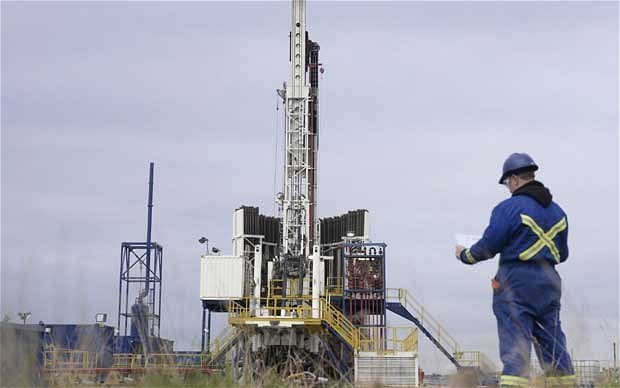Half of prime minister David Cameron’s cabinet face having their water reserves fracked under the controversial Infrastructure Bill but it remains unclear if Cameron’s own Oxfordshire constituency would also be subject to fracking.
More than 220 Tory and Lib Dem MPs and their constituents risk fracking firms drilling through sensitive water reserves in their respective areas, reveals analysis by Greenpeace UK.
The findings were published just days before MPs cast their first vote on the Infrastructure Bill, which currently fails to ban fracking near groundwater reserves, or aquifers, and would see shale gas companies allowed to drill underneath people’s houses.
It follows a petition by environmental campaigners urging the prime minister to rethink his “all out” support for fracking. The petition was handed into No. 10 Downing Street this week with more than a quarter of a million signatures.
“Whether MPs are in favour or against fracking, protecting Britain’s major sources of drinking water from this risky industry should be a no-brainer,” said Simon Clydesdale, energy campaigner for Greenpeace.
“You simply don’t take chances with such a vital and irreplaceable resource, especially when evidence of harmful impacts from fracking keeps growing.”
Cameron’s Constituency
Greenpeace’s findings highlight that a large proportion of aquifers – with some directly feeding into drinking water reserves – are overlapped by proposed licensed fracking areas. These include the constituencies of senior Tory officials and cabinet members George Osborne, William Hague and Theresa May.
However, Cameron has failed to confirm if fracking would actually happen in his Oxfordshire constituency of Witney.
In December, fellow Conservative MP Anne McIntosh remarked that fracking would “not be coming to Witney anytime soon.” But Cameron responded saying he would be “very happy” if fracking were to occur in his constituency.
Fracking licences have already made available in south and north-east Oxfordshire in the 14th round of onshore licensing last year, reported the Oxford Guardian, but Cameron’s constituency has remained safe so far.
Tory Cover-Up
The controversial Infrastructure Bill which is to be voted on by MPs next week has faced ongoing public protest and criticism from both sides of the chamber, with cross party backbenchers now calling for a two-year moratorium on fracking across Britain.
Green MP Caroline Lucas, a primary MP leading the opposition to the Infrastructure Bill, is calling for a moratorium on fracking. Former Tory environment secretary, Caroline Spelman has also backed calls for a moratorium on fracking.
“The impact of fracking is potentially vast. That’s why it’s so important that the possible environmental, climate, health and economic impacts are fully assessed and acted upon,” Lucas has previously stated. “Heavily redacted impact reports are doing little to alleviate concerns.”
Alan Whitehead and Tom Greatrex, both Labour MPs, accused David Cameron of a cover-up over fracking. The prime minister failed to explain why the government had made 63 redactions to a fracking document before it was published under Freedom of Information rules.
The government has yet to release an unredacted version of its Shale Gas: Rural Economy Impacts report detailing the impact of fracking on house prices, first requested by Request Initiative on behalf of Greenpeace.
“Large sections of the report, dealing precisely with the issue of the cumulative effect of fracking, have been redacted.”
Over half of the country is now licensed to be fracked, with areas including cities, groundwater protection zones and national parks within the proposed licensed areas.
Cameron is facing pressure to convince the general public that shale is indeed safe, with a recent YouGov poll showing more than half (56%) of people in Great Britain being against fracking on land that feeds Britain’s aquifers.
Photo: Cuadrilla via Creative Commons
Subscribe to our newsletter
Stay up to date with DeSmog news and alerts







